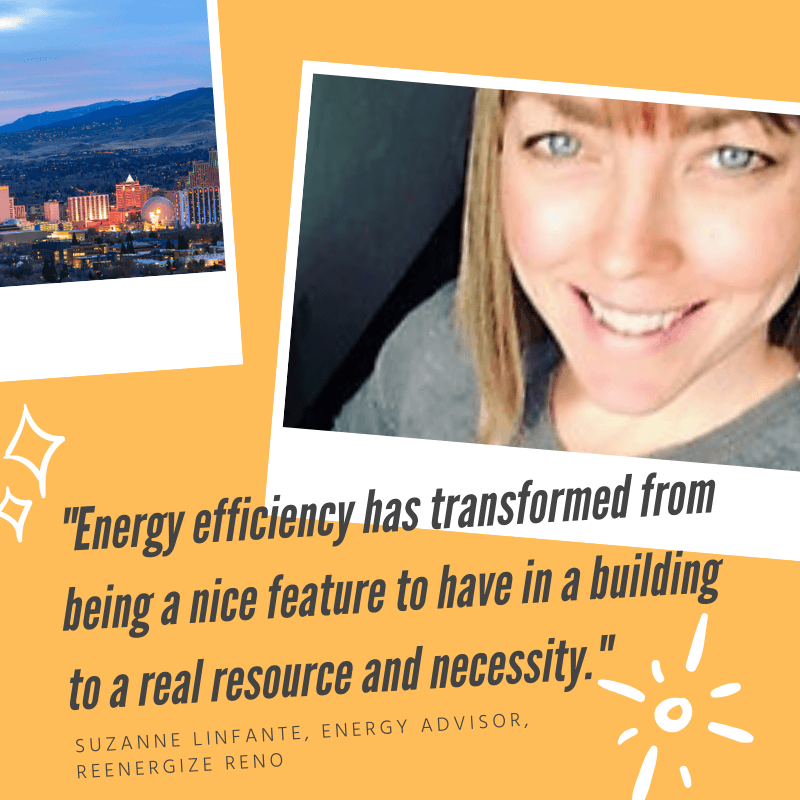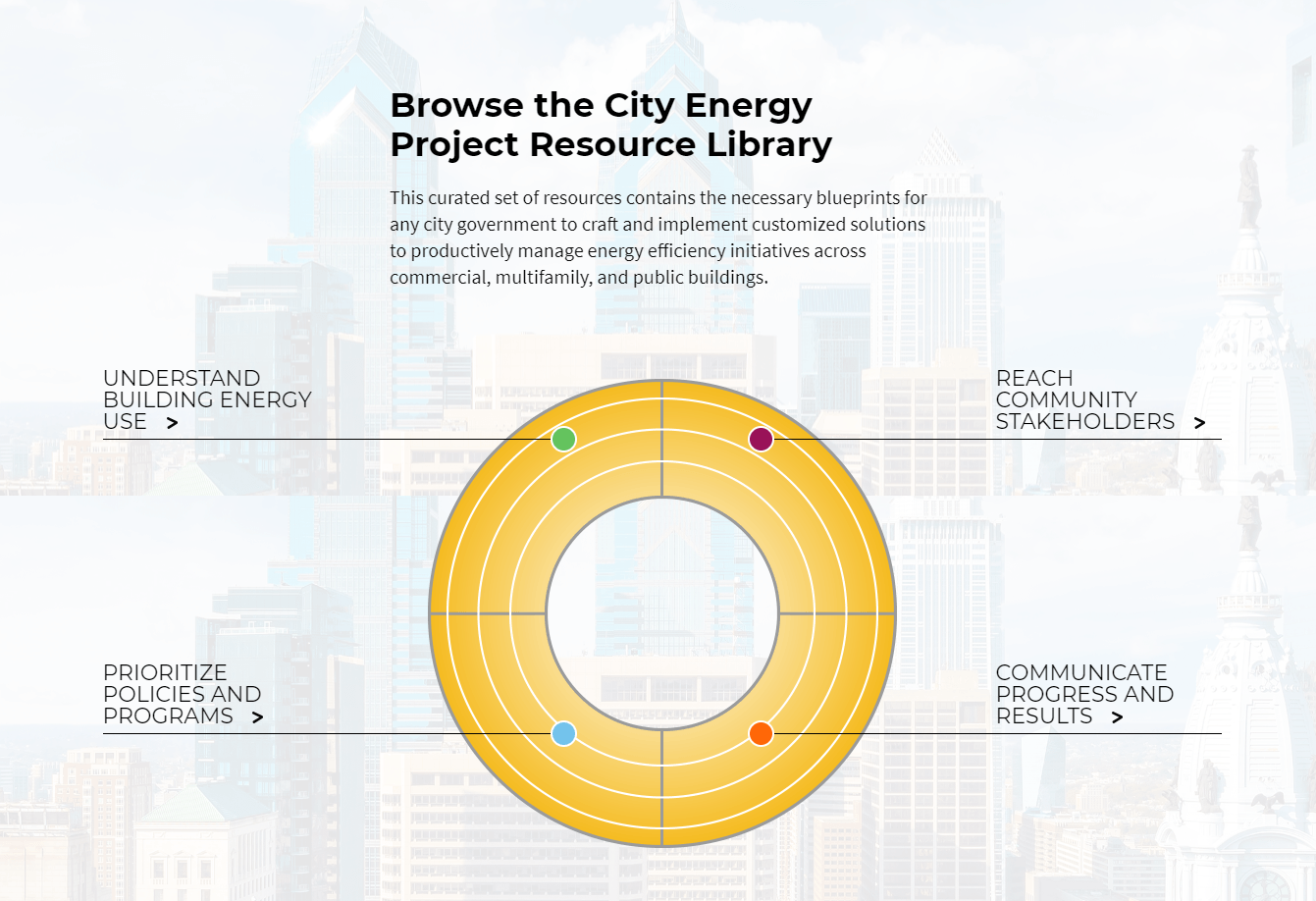Reno, the Biggest Little City in the World, is going big on efficiency with ReEnergize Reno, which seeks to improve the efficiency of commercial, industrial, and multifamily buildings by 20 percent by 2025. What does it take to lead this work? The City Energy Project, a national initiative from IMT and the Natural Resources Defense Council, embedded staff in 20 participating cities across the U.S. with a focus on boosting energy efficiency in buildings. These City Advisors help ensure that the energy efficiency efforts pursued by a city are customized to best meet local needs to maximize returns. As Energy Advisor to the City of Reno through the City Energy Project, Suzanne Linfante engages community stakeholders and designs and implements policies to reduce energy use in the city’s building stock. Before joining the City of Reno, she worked for the Nevada Office of Energy and has experience in telecommunications and commercial real estate.

Tell us a bit about your professional background and what drew you to efficient and climate work.
My degree is in business management and political science, with a minor in Entrepreneurship from the University of Nevada, Reno. I also hold a certificate in Energy Innovation and Emerging Technologies from Stanford University, and am a certified Green Building Operations & Maintenance Professional. Prior to working with the city, I worked for Nevada Governor Brian Sandoval as an Energy Program Manager, specializing in renewable energy programs and policy, for six years. Prior to that I worked mostly in commercial real estate.
In my current position, I combine technical experience with program creation and management. I joined the City of Reno because I felt I could have a greater impact at the local government level. I was drawn to this work during my senior year of college, when I attended a lecture by a representative from the Small Business Administration. He mentioned how hard it was for small businesses to navigate government incentives and programs and I knew I wanted to be part of closing that gap.
Working at the state, there were many moving parts to keep track of. Though we were getting a lot done, it was hard to see the direct impacts of the projects you’re working on, as they could be on the other side of the state. Working with the city government in Reno, I’m able to see the impact I’m having on the community around me simply by engaging with our citizens and businesses.
What you do in your role as Energy Advisor?
My primary role is to focus on the commercial green building sector, primarily in the implementation of our Energy & Water Efficiency Program ordinance which passed earlier this year. I also maintain our Better Buildings Challenge, ReEnergzie Reno, which involves providing our community with the tools to improve energy efficiency and comply with our ordinance. To that end, I coordinate our monthly workshop series to educate the participants under ReEnergize Reno and the community. I oversee citywide benchmarking efforts and track energy and cost savings, and work to secure clean financing for Reno’s businesses through partnership with the Nevada Clean Energy Fund and through Commercial Property Assessed Clean Energy (C-PACE) Financing. I also am working on other training programs for the larger community, including Building Operator Certification Training and 2018 energy code compliance.
What excites you most about the City Energy Project?
The City of Reno is really starting from ground zero and green building will have a place in this market by the end of the project. Through my role, I enjoy the opportunity to work with and educate the public. Reno faced some challenges during the recession and community members are still picking up the pieces. The City Energy Project has helped us to create an emergent but solid green-building community.
What skills do you have that have helped you the most in your work?
I have a lot of experience in program management, policy, and rulemaking, and I consider myself to be a good negotiator. I am also detailed and well-organized, which enables me to look ahead to potential problems and mitigate them. While employed in title/escrow, I was also a staff trainer.
What is unique about working in a smaller city such as Reno?
It’s a lot easier to build a community and identify champions in a smaller city like Reno. Moreover, a single person or group of people can have a larger impact than they otherwise would in a larger city. For example, our building stock is a lot smaller than a larger city such as New York or Chicago, so each building we reach with the ordinance is all the more important.
Our sustainability department is very small, and consists of myself, Reno’s Sustainability Manager, and two interns.

What are your hopes for Reno in the future? What are you most proud of so far?
I hope that we can be recognized as a city with well thought-out plans around sustainability. I think we can be innovative in our approach and pioneer initiatives for small cities like ours. I’m most proud of the community that has grown up around green building during the past few years. In Reno, we are building a community of advocates and champions, and changing mindsets about energy efficiency. Energy efficiency has transformed from being a nice feature to have in a building to a real resource and necessity.
What advice would you have for other cities interested in becoming more sustainable?
First, you have to build momentum and a following with the community. Networking is important, but your network is most important. In Reno, we created champions and some of the folks that are our biggest supporters are people I never would have thought of. We engaged them though a workshop series, an awards event, emails, Twitter, one-on-one meetings, and leading by example.
Second, it’s not one size fits all. I believe in being somewhat creative so that the community feels involved and rewarded. Implementing Reenergize Reno, our challenge program, taught me to do a lot of up-front problem solving long before the stakeholder process and drafting of the ordinance began. It laid a foundation to see what supporters the city would need in place to implement a benchmarking ordinance and helped me to get a head start collaborating with stakeholders such as our utility for technical support. It also gave them the advance opportunity to learn about how the community’s needs are evolving. In Reno, our up-front problem solving process took the form of a lot of one-on-one stakeholder meetings to address questions before they are even raised.
What progress has Reno made?
My time with the city has been a whirlwind. So far, I have created a successful monthly workshop series, will be launching Commercial Property Assessed Clean Energy (C-PACE) financing this month, convened a broad well-represented policy committee, benchmarked our municipal buildings, joined a Department of Energy Commercial-PACE working group, created a blog series, launched a municipal Twitter account, helped to launch automated whole-building data aggregation, facilitated a green building group for our Sustainability & Climate Action Plan, created a draft ordinance, won a grant to retrocommission our fire stations, and worked through an ASHRAE Level 2 audit of City Hall.
What are some other areas where you think Reno could grow and continue its efforts toward a sustainable future?
As it relates to green building, there are many areas we need to address such as commercial infill, multifamily housing, and water conservation. On a broader scale, I believe we need very focused efforts around solid waste management, energy and water conservation, and internal resource management. My role as a city advisor has given me the responsibility and the opportunity to create a market for energy efficiency in Reno, to create jobs, and to create financing opportunities for our local businesses and building owners.

The City Energy Project is a national initiative to create healthier, more prosperous American cities by improving the energy efficiency of buildings. The pioneering actions taken by the 20 participating cities are now distilled in a cured yet comprehensive City Energy Project Resource Library, a must-use tool for any jurisdiction on how to leverage energy efficiency to reach ambitious climate, economic, and social goals. Learn more at cityenergyproject.org.
